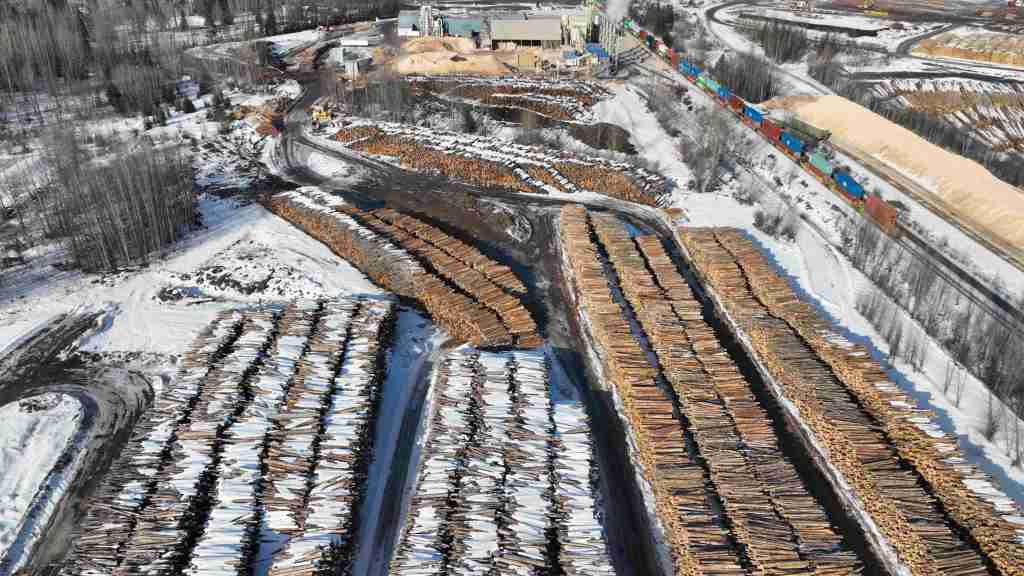“Company misled public about improved air quality“
Two northern organizations called on Environment Minister George Heyman this week to suspend a permit for NewPro pellet company in Smithers.
Conservation North and Bulkley Valley Clean Air Now say that, in its application to convert a particle board plant to a wood pellet mill, NewPro claimed the mill would help to substantially reduce slash burning in the Smithers area because the mill would use slash wood waste to make wood pellets.
Every year in the Bulkley-Nechako airshed, thousands of slash piles – the woody debris left behind at logging operations – are deliberately set on fire, filling the Bulkley Valley with smoke containing fine particulate matter that can cause serious lung and heart ailments.
NewPro was granted the permit under the Environmental Management Act based on claims about particulate matter emissions, the groups say. The company claimed it would use the material from 1,200 slash piles each year for pellet manufacture.
But no reductions in slash burning have been apparent since the pellet mill opened in late 2018. The groups say the company is using whole logs instead of waste wood.
“We are extremely concerned [that] despite the company’s assertions, the slash burning continues and our airshed continues to be choked with smoke for months on end. Instead of chewing through slash, the local pellet mill is chewing through whole logs,” says Len Vanderstar of Bulkley Valley Clean Air Now.
They say the B.C. government’s own data shows that large quantities of whole logs are turned directly into wood pellets at the Smithers’ mill, and at other pellet mills in Burns Lake, Houston and Quesnel.
Vanderstar notes that the NewPro pellet mill yard is stacked full of logs that are generally considered to be pulp wood or Grade 4 logs. “Such logs have never been considered to be logging slash before,” Vanderstar says.
Conservation North Director Michelle Connolly says, “Contrary to claims that they use residual wood, including logging slash and sawmill waste, pellet makers like Drax use hundreds of thousands of logs per year. Those logs all come from B.C.’s rapidly disappearing primary forests, which partly explains why we are in the ecological crisis we are.”

After receiving their permit, NewPro sold its Smithers particle board plant to Pinnacle Renewable Energy and local sawmill owner, West Fraser. The pellet mill became the newest of a number of such mills owned by Pinnacle in B.C.’s interior region.
Pinnacle was later purchased by U.K.-based Drax Group. Drax operates the largest single-point source of wood pellet consumption in the world, a giant thermal electricity plant in North Yorkshire England, where wood pellets are burned to generate steam that then spins the facility’s turbines.
The organizations say that the government should require the pellet mill’s current owner — Drax — to fully disclose how many logs vs. actual logging slash it uses at its Smithers plant and to show how many slash piles have not been burned as a direct result of its operations.
“We also want to see the Environmental Management Act amended so that . . . permits will be cancelled outright if companies make misleading claims,” Vanderstar says.

Drax holds a clear monopoly in B.C., the groups say. It owns or co-owns seven of B.C.’s 12 pellet mills, which account for about two thirds of all of the province’s wood pellet production.
Last fall, investigative documentaries by CBC’s Fifth Estate and BBC’s Panorama each chronicled the large volume of whole logs being run through Drax’s B.C. pellet operations and also noted the large piles of slash that continued to be left behind at logging operations and burned.
“Clearly, the Smithers pellet mill has not contributed to a dramatic reduction in slash-burning in our airshed. Unfortunately, slash-burning continues to be the single-worst source of air pollution in our valley,” Vanderstar says.
For more information see Bulkley Valley Clean Air Now.